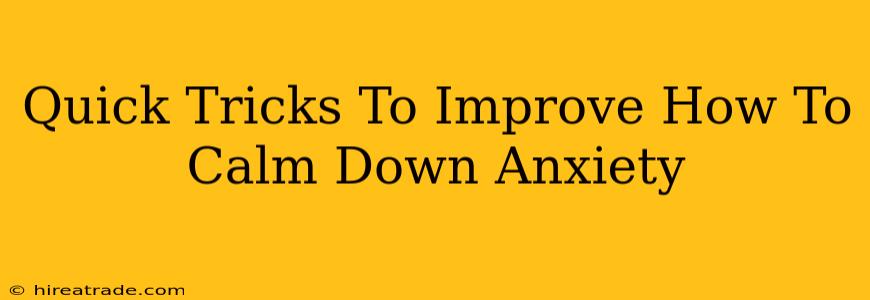Anxiety. That knot in your stomach, the racing heart, the feeling of impending doom. We've all been there. While professional help is crucial for managing long-term anxiety, there are quick tricks you can use to calm yourself down in the moment. These techniques aren't a replacement for therapy, but they can be powerful tools in your self-care arsenal.
Breathe Your Way to Calm
This might sound simple, but controlled breathing is incredibly effective. When anxious, our breathing becomes shallow and rapid. Deep, slow breaths activate the parasympathetic nervous system, which helps slow your heart rate and ease tension.
Try this:
- Box Breathing: Inhale deeply for a count of four, hold for four, exhale slowly for four, and hold again for four. Repeat several times.
- 4-7-8 Technique: Inhale deeply through your nose for a count of four, hold your breath for seven, and exhale slowly through your mouth for eight. This technique can be particularly helpful before bed to promote relaxation.
Grounding Techniques: Connect to the Present
Anxiety often stems from worrying about the future or dwelling on the past. Grounding techniques bring you back to the present moment, interrupting the cycle of anxious thoughts.
Effective Grounding Exercises:
- 5-4-3-2-1 Method: Identify five things you can see, four things you can touch, three things you can hear, two things you can smell, and one thing you can taste. This simple exercise anchors you in your surroundings.
- Sensory Focus: Pay close attention to the sensations in your body. Notice the weight of your body in the chair, the texture of your clothing against your skin, the temperature of the air.
Muscle Relaxation: Release the Tension
Physical tension often accompanies anxiety. Progressive muscle relaxation involves tensing and releasing different muscle groups to relieve this tension.
How to Practice Progressive Muscle Relaxation:
Start with your toes, tensing the muscles for a few seconds, then releasing. Slowly work your way up your body, tensing and releasing each muscle group in turn. Focus on the feeling of release as you let go of the tension.
Engage Your Senses: Sensory Overload (in a good way!)
Sometimes, a shift in sensory input can be incredibly helpful.
Sensory Diversions:
- Listen to calming music: Soothing melodies can have a profound impact on your mood.
- Diffuse essential oils: Lavender and chamomile are known for their calming properties.
- Enjoy a warm drink: The warmth can be physically soothing.
Mindfulness and Meditation: Train Your Mind
Practicing mindfulness and meditation regularly can build resilience to anxiety over time. Even a few minutes a day can make a difference. There are countless guided meditations available online and through apps.
Important Note: These techniques are helpful coping mechanisms, but they are not a substitute for professional help. If you're struggling with anxiety, please reach out to a therapist or counselor. They can provide personalized strategies and support to manage your anxiety effectively. Remember, you're not alone, and help is available.

